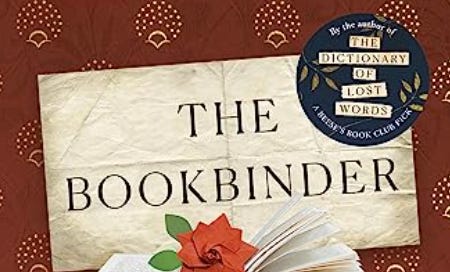Since it’s Labor Day, a factory. In this case, the bookbindery of Oxford Press, circa 1914. Men set the type, man the presses, and affix the covers. On the “girls’ side,” pages are folded, stitched, and bound. Watching a 1925 film of the women at work, Pip Williams, author of The Bookbinder, “was struck by footage of a woman gathering up long sheets of pages, sometimes sixteen pages per side, so they could be folded then bound together.
“‘She sort of moved along the gathering bench like she [was] dancing,” Williams observed. “She’s done it 1,000, 2,000 times and she had this rhythm which was really graceful. “The women did the things that are invisible. It’s beautiful, it’s what holds the book together – a well-bound book depends so much on what the women have done.”
Williams wondered, “as the woman onscreen swept the pages into her arms, did she ever stop to read them?”
Peggy Jones does—in brief, frustrating moments, before crabby Mrs. Hogg reminds her that her job is to fold the pages not read them. Hungry for knowledge, she reads the books her mother salvaged from the book bindery over years of working there, along with those she’s begun to collect herself. The narrow boat, Calliope, where she lives with her sister, is quite literally full of them. Some are complete, rejected by the press for a scratched cover or imperfect folds; most are bits of books abandoned in the early stages of assembling them.
Peggy is intelligent, she longs for nothing more than a real education, and the presence of Somerville College across the street from The Oxford Press is a daily dose of salt in the wound of knowing where she does not and will not ever belong.
She will always be responsible for her identical twin Maude, whose echolalia and (probably) autism, makes her vulnerable. Maude is perfectly functional in her job as a folder at the bookbindery, though—and is happy in the family of women there, who love her and keep an eye out for her. In the evenings, Peggy reads; Maude folds discarded pages from books into paper sculptures—birds, hearts, snowflakes—that are strung like bunting throughout the boat.
Peggy can’t imagine that anything in her life will ever change.
Then World War I begins. Many of the men from the bookbindery, including their neighbor Jack Roundtree, march through Oxford on their way to training. Refugees from war-torn Belgium flood the town and, soon, wounded soldiers begin to arrive from the front.
Early in the book, the women employees are sent to help welcome a train of Belgian refugees. Lotte falls into Maude’s arms and becomes an integral part of the story. She has lost everything, but for a long time won’t speak of what, exactly, she’s lost—though her steadfastness in caring and protecting Maude from the moment they meet makes Peggy think, perhaps, she’s lost a child.
When Peggy volunteers to read to wounded soldiers, she’s partnered with Grace, a well-to-do Somerville College students, and the two develop an unlikely friendship. She meets Sebastien, a wounded Belgian soldier, who becomes a friend—and more—as the story unfolds.
And there is Tilda, Peggy and Maude’s mother’s dearest friend, an actress and suffragette, who sends letters from the front, where she’s volunteering as a Red Cross nurse.
Williams’ evocation of time and place is brilliant. Her juggling act of people and events, flawless. I never once came up out of this novel confused by what was happening or what mattered. When Peggy gets the chance to maybe, maybe make her dream come true I felt like I was the one whose future was at stake.
Once, I was a person with an impossible dream myself. The circumstances of my own childhood and adolescence made it extremely unlikely that I would end up where I am now. I’m still not exactly sure how I did, though determination, discipline, and the ruthlessness of insisting on what I knew my parents couldn’t afford played a part. Plus, the luck of right person falling in love with me, believing in me early on.
Did getting where I wanted to be make me feel like I belonged? Not really. Still, I’m so grateful that I persevered.
The Bookbinder is about so many things but what blew me away is how perfectly and painfully it illustrates how those who truly love to learn are all too often denied the paradise of books and learning a formal education affords.
As a high school teacher, I saw so many intelligent, hard-working students whose financial circumstances made college impossible. And, of course, many less intelligent, less hard-working who went off to college because…they could.
What a different country ours would be if we honored those who genuinely love to learn with the opportunity to learn more and more and more—until there are enough of them to step up and take command.
Would they be better at it? You know, I think they might.
Pip Williams hand-binding The Bookbinder of Jericho. (British title)
https://www.youtube.com/watch?v=P5yNcLnyCMQ







Another compelling review. Thank you.
Sadly, I think you're right about it getting worse.